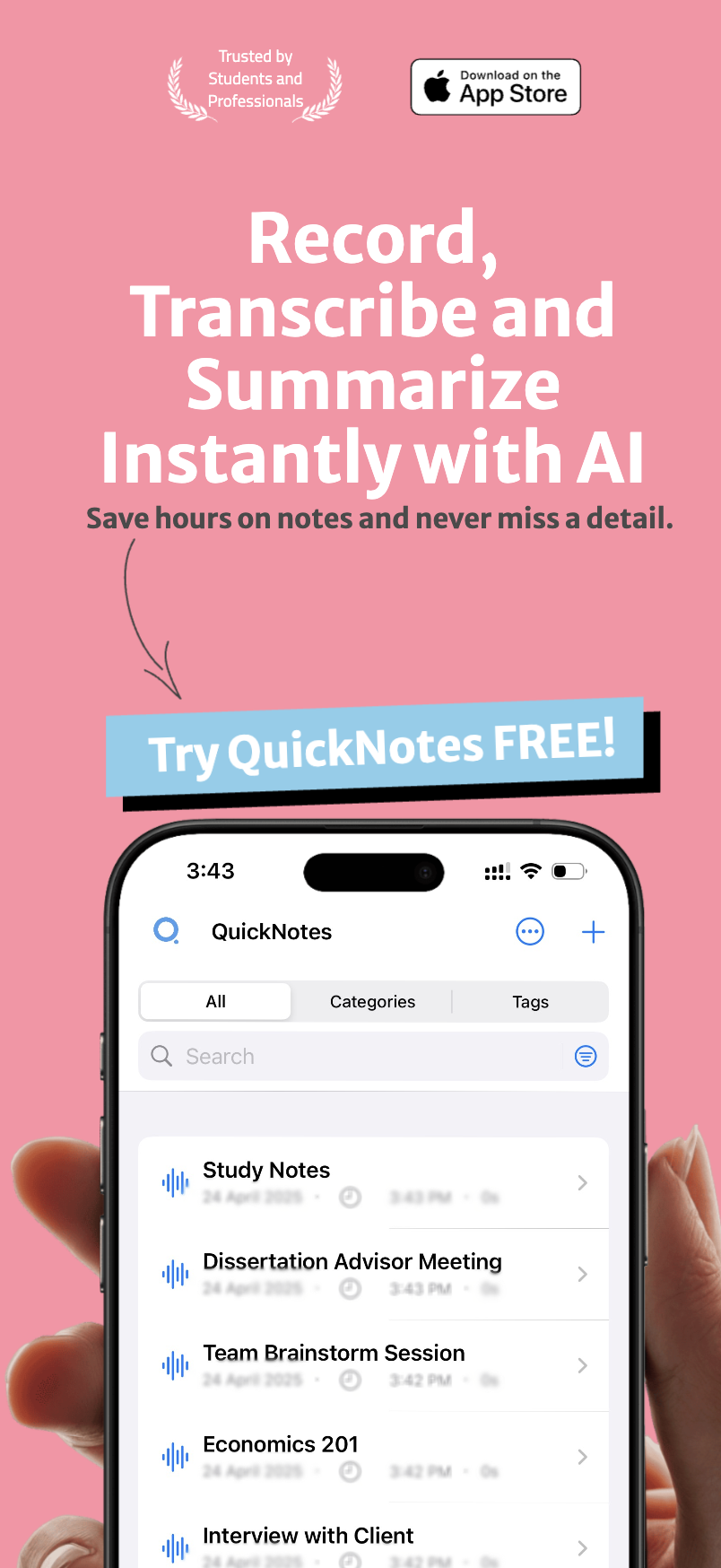In today's distraction-filled world, the ability to focus deeply on challenging work is becoming increasingly rare—and increasingly valuable. Cal Newport's groundbreaking book "Deep Work" defines this skill as "the ability to focus without distraction on a cognitively demanding task." It's a skill that allows you to quickly master complicated information and produce better results in less time.
Table of Contents
- Understanding Deep Work and Flow State
- Deep Work
- Flow State
- Why Deep Work Matters in the Distraction Economy
- 1. Complexity Demands Depth
- 2. Shallow Work is Increasingly Automatable
- 3. Quality Over Quantity
- Creating Your Deep Work Practice
- 1. Schedule Deep Work Blocks
- 2. Create a Distraction-Free Environment
- 4. Practice Productive Meditation
- How QuickNotes Supports Deep Work
- 1. Capture Insights Without Breaking Flow
- 2. Process and Organize Insights After Deep Work
- 3. Prepare for Deep Work Sessions
- Measuring and Tracking Your Deep Work Progress
- 1. Time Spent in Deep Work
- 2. Depth of Focus
- 3. Output Quality
- Balancing Deep and Shallow Work
- Conclusion: The Deep Work Advantage
- You Might Also Like
Yet many of us struggle to achieve this focused state, constantly interrupted by notifications, emails, and the temptation to check social media. In this article, we'll explore how to cultivate deep work habits and harness the power of flow state to transform your productivity and academic performance.
Understanding Deep Work and Flow State#
Before diving into practical strategies, it's important to understand the difference between deep work and flow state, two related but distinct concepts:
Deep Work#
Deep work is a deliberate practice. It's when you dedicate uninterrupted time to focus intensely on a cognitively demanding task, pushing your cognitive capabilities to their limit. It's characterized by:
- Zero distractions
- Extended periods of concentration (usually at least 60-90 minutes)
- Working at the edge of your intellectual capabilities
- Clear goals and purpose
Flow State#
Flow state, a concept popularized by psychologist Mihaly Csikszentmihalyi, is a mental state where you become fully immersed in an activity, experiencing:
- Complete absorption in the task
- Loss of self-consciousness
- Distorted sense of time (usually feeling like time passes quickly)
- Intrinsic reward from the activity itself
- A balance between challenge and skill level
While deep work is a deliberate practice you can schedule, flow state is more of a psychological phenomenon that often occurs during deep work sessions. You can set conditions for flow to emerge, but you can't force it directly.
"The best moments usually occur when a person's body or mind is stretched to its limits in a voluntary effort to accomplish something difficult and worthwhile." — Mihaly Csikszentmihalyi
Why Deep Work Matters in the Distraction Economy#
In our current "attention economy," the ability to do deep work is becoming both increasingly rare and increasingly valuable. Here's why:
1. Complexity Demands Depth#
The most valuable work in today's economy often involves learning complex systems, solving difficult problems, or creating new solutions. These high-value activities require uninterrupted focus and cannot be accomplished in short, distracted bursts.
2. Shallow Work is Increasingly Automatable#
Routine tasks that don't require deep concentration are the most likely to be automated. Developing your capacity for deep work is a form of future-proofing your skills.
3. Quality Over Quantity#
Deep work produces higher quality results. One hour of focused, distraction-free work can be more productive than three hours of fragmented attention.
Creating Your Deep Work Practice#
Developing a deep work practice isn't about working longer hours—it's about working smarter by protecting your most valuable cognitive resources. Here are key strategies for cultivating your deep work capacity:
1. Schedule Deep Work Blocks#
Rather than hoping to find time for focused work, explicitly schedule deep work blocks in your calendar. Treat these appointments with yourself as sacred, just as you would an important meeting. Start with 60-90 minute blocks and gradually build up your capacity.
2. Create a Distraction-Free Environment#
Design your workspace to minimize potential interruptions:
- Turn off all notifications on your devices
- Use website blockers to prevent access to distracting sites
- Consider noise-cancelling headphones if in a noisy environment
- Create a physical signal to colleagues that you're in deep work mode (like a specific sign or wearing headphones)
Establish consistent rituals that signal to your brain it's time for deep work. This might include:
- Starting with a specific warm-up activity
- Working in the same location
- Having a particular beverage or background sound
- Setting clear goals for the session
4. Practice Productive Meditation#
Use physically demanding but mentally undemanding activities (like walking or showering) to think through complex problems. This trains your mind to stay on a single problem without external stimulation.
How QuickNotes Supports Deep Work#
While tools alone can't create a deep work practice, the right ones can significantly enhance your ability to focus and capture insights. QuickNotes offers several features that align perfectly with deep work principles:
1. Capture Insights Without Breaking Flow#
During deep work sessions, you'll often generate valuable insights or questions that aren't directly related to your current task. Rather than switching contexts to handle these thoughts (breaking flow), QuickNotes' audio recording capability allows you to quickly capture these ideas without interrupting your primary focus.
According to the QuickNotes Functions documentation, the app offers "high-quality audio recording with a clean, intuitive interface" and "recording controls" that let you "start, pause, and stop recordings with real-time duration display." This makes it perfect for maintaining flow state while ensuring no valuable thoughts are lost.
2. Process and Organize Insights After Deep Work#
After your deep work session, QuickNotes helps you process the insights you've recorded:
- The "Speech-to-Text" feature converts your spoken thoughts to searchable text
- The "AI-Powered Summaries" capability can identify key points from longer thought recordings
- The organization system with "Categories" and "Tags" helps you integrate new insights into your knowledge management system
3. Prepare for Deep Work Sessions#
QuickNotes can help you prepare for deep work by allowing you to organize your thoughts and materials beforehand. The app's "Library Management" features, including the ability to organize recordings by customizable categories and apply multiple tags, creates an organized environment for your ideas. This preparation reduces the cognitive load of figuring out what to work on, allowing you to dive straight into deep focus.
Measuring and Tracking Your Deep Work Progress#
To improve your deep work capacity, it's helpful to track your progress. Here are some metrics to consider:
1. Time Spent in Deep Work#
Keep a log of your deep work hours. Aim to gradually increase this over time.
2. Depth of Focus#
After each session, rate your level of focus on a scale from 1-10. Note what affected your concentration positively or negatively.
3. Output Quality#
Track the quality of work produced during deep work sessions compared to your normal workflow.
You can use QuickNotes to maintain this log, recording quick reflections after each deep work session and organizing them with appropriate tags for later analysis.
Balancing Deep and Shallow Work#
While deep work is invaluable, most careers also require some amount of "shallow work"—non-cognitively demanding, logistical tasks that can often be performed while distracted. The key is not to eliminate shallow work but to:
- Be intentional about when you do shallow vs. deep work
- Batch similar shallow tasks together
- Schedule shallow work during your lower energy periods
- Protect your peak cognitive hours for deep work
Conclusion: The Deep Work Advantage#
In our increasingly distracted world, the ability to perform deep work is becoming a significant competitive advantage. By deliberately practicing focused concentration, creating environments conducive to flow, and using tools like QuickNotes to support your process, you can dramatically improve both your productivity and the quality of your work.
Remember that developing deep work habits is a gradual process. Start with modest goals—perhaps just one hour of deep work per day—and slowly build up your capacity. Over time, you'll find yourself able to achieve levels of productivity and insight that seemed impossible in your previously distracted state.
The combination of intentional deep work practice and the right supporting tools can transform not just your productivity, but your relationship to your work itself—making it more meaningful, engaging, and rewarding.
You Might Also Like#

AI-Powered Summarization: Extract Key Insights Instantly
Learn how QuickNotes' AI summarization technology helps you extract key insights from lengthy recordings and transcriptions, saving time and improving information retention.

Organization and Tagging: A System for Effective Information Management
Learn how QuickNotes' powerful organization and tagging system helps you categorize, find, and utilize your notes and recordings effectively.

Multi-Language Transcription: Breaking Down Communication Barriers
Discover how QuickNotes' multi-language transcription capabilities can break down communication barriers and streamline global collaboration.

